Novak Djokovic Is the Last GOAT Standing
In any outdoor market running through an urban downtown, there is inevitably a T-shirt vendor. And at the entrance to Kalemegdan Park, at the base of a pedestrian promenade in Belgrade, the T-shirt guy offers two main choices. One is a shirt adorned with an image of Novak Djokovic, face contorted in intensity, as he is, no doubt, about to win one tennis title or another. The other option features Nikola … no, not Jokić, but Tesla, the Serbian American inventor and engineer, best known for pioneering alternating current in the late 1800s. Such is the status conferred on Djokovic in his homeland.
Djokovic’s level of esteem is not much different in the tennis sector. Except that here, he stands alone. He isn’t just a generational figure; he’s a transformational one, who, not unlike Tesla—also, by the way, tall, lanky and sometimes overshadowed by a rival—is a technician and a futurist, constantly pushing the parameters of possibility.
Fresh off a year in which he, yet again, won three of the four tennis majors, Djokovic began 2024 by winning five matches at the Australian Open, an event he has won 10 times before. Though he was uncharacteristically flat in a semifinal defeat to 22-year-old Italian Jannik Sinner, Djokovic remains—a few months from turning thirty-frickin’-seven years old—the world’s No. 1 ranked player.
Djokovic will head to the French Open in May as the defending champ, hoping to add a 25th major to his plunder, most in tennis history, male or female, modern or dead ball. It’s one of those sports stats that gets regurgitated without context, so let’s pause to consider that titans like John McEnroe won seven majors and Jimmy Connors won eight. The Djokovic haul of 24 is more than Andre Agassi (eight) and Pete Sampras (14) combined.
Shall we keep going? Djokovic has won 74 other tournaments that are not majors. He has won more prize money (more than $180 million) than any other player in history. He has spent more time ranked No. 1 than any player, 410 weeks and counting as of Feb. 1. He has also claimed perhaps the most prestigious title in the sport’s history, albeit one for which there is no trophy or winner’s check.
For a full decade, The Republic of Tennis was obsessed with a parlor game, “Who is the GOAT?” a three-way derby among Djokovic, Roger Federer and Rafa Nadal. Three years ago, they were, fittingly, tied with 20 majors apiece. Now? Federer retired with 20. Nadal has 22, but a few months from turning 38, his body has entered full rebellion mode and he is unlikely to add to his collection.
And then there is Djokovic, who powers on, with no obvious signs of decline. As the country music lyric goes, he has dutifully kept the old man out.
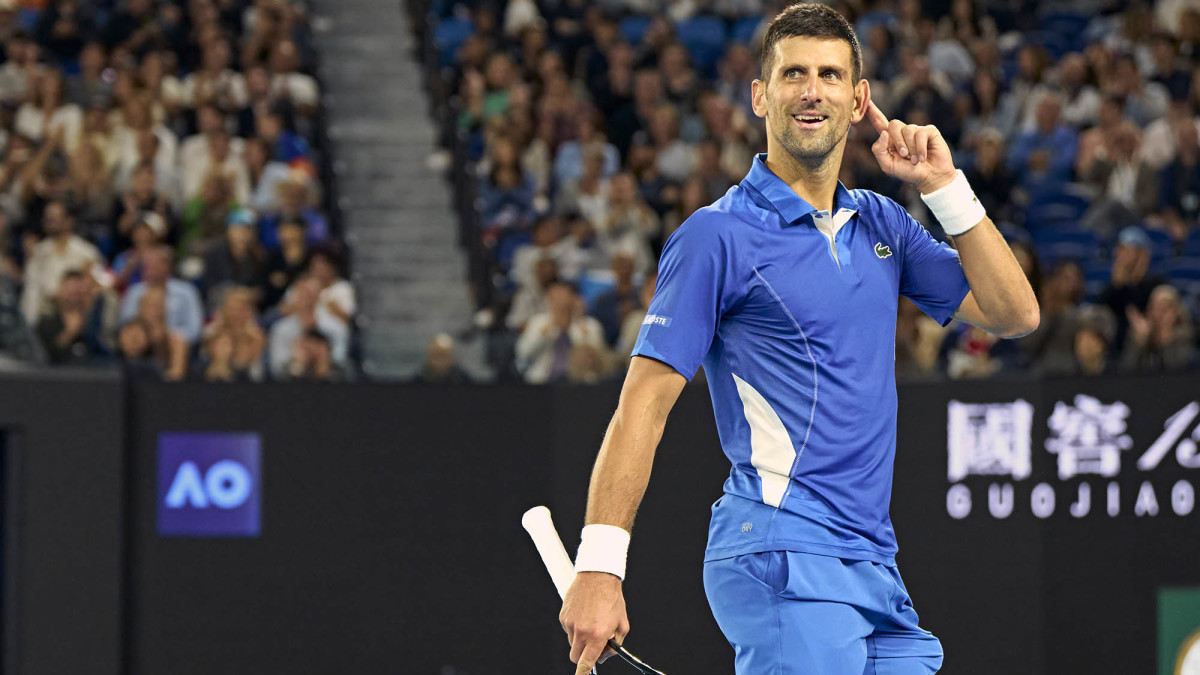
So many top-tier athletes are sheepish about their greatness and longevity. They’ll let others anatomize their excellence, while they either offer platitudes or escape the locker room out the back door. Trying to get, say, the aforementioned Nikola Jokić to talk about himself is like getting Bill Belichick to discuss his favorite stuffed animals.
Djokovic, though, does nothing conventionally, forever zigging where other athletes/celebrities/humans zag. (Digression for one example among countless: The guy doesn’t exactly roll deep, as this interview was brokered in part by his manager, Carlos Gomez-Herrera … who is also his hitting partner.) And, as someone naturally and ferociously curious—“a true seeker,” Agassi calls Djokovic—he is happy to ponder the mystery of his peerlessness.
He is as interested and amused in his singularity as the rest of us are. Much the same way he will happily take a visitor around Belgrade, pointing out spots of interest, he is remarkably open to offering an annotated tour of his mind and body. How did he get so damn good, able, as he is, to make a credible case for being the best athlete on the planet? We’ll let him guide us.
Sitting in the conference room of his foundation near the confluence of the Danube and Sava rivers, Djokovic suggests we start with a nod to nature, or “genetical predispositions,” to use his vernacular. Put simply, he has an ideal tennis body—6' 2", 170 pounds—and negligible body fat. Though he works on it, he has always been able to contort his body in ways that would make a prima ballerina envious. “My mom [Dijana] actually graduated from a university of sports,” he says. “She did volleyball, she did gymnastics, she’s quite lean and tall.” His father, Srdjan, and his mother were both competitive skiers in the Yugoslav sports system.
Then comes nurture, married with circumstance. Djokovic was born in Belgrade in 1987, and two years later, with the former Yugoslavia breaking apart, sometimes violently, the family moved four hours away to the mountain town of Kopaonik, near the border between Serbia and the disputed territory of Kosovo. There, the Djokovic family ran a joint they called Red Bull pizza.
To say money was tight would be to traffic in understatement. Dijana and Srdjan pushed the oldest of their three sons hard, yes, because they wanted him to maximize his athletic gifts, but also because there was a financial imperative. At one point when he showed true promise in tennis, Novak ventured to Germany to train at an academy. There, the coach’s wife nicknamed Djokovic “The Jacket,” because he did not have one.
Before Djokovic turned pro in 2003, the family turned to loan sharks to come up with the capital to fund his training and travel. Djokovic tells the story of his father putting 10 deutsche marks (roughly $10) on the table, and flatly announcing to the family “that’s all we have.” Djokovic recalls: “We were waiting in line for bread—a loaf of bread that we all lived on for the entire day. So those are the kinds of circumstances I grew up in. I think [that] helped shape me into the person I am today and helped me understand and appreciate everything I possess and much more.”
The family’s desperation and survival instincts mirror that of the entire country. Serbia became an official independent state in 2006 after the dissolution of Yugoslavia. But that was only the latest convulsion. Djokovic is quick to tell visitors that, in its history, Belgrade has been invaded more than 40 times. “More than any city in the world!” he adds. And, damn, if he doesn’t access all this when he plays, lessons are embedded in everything from his playing style to his attitude. The importance of defense. The need to keep evolving. Skepticism of rivals. Coping skills in the face of conflict.
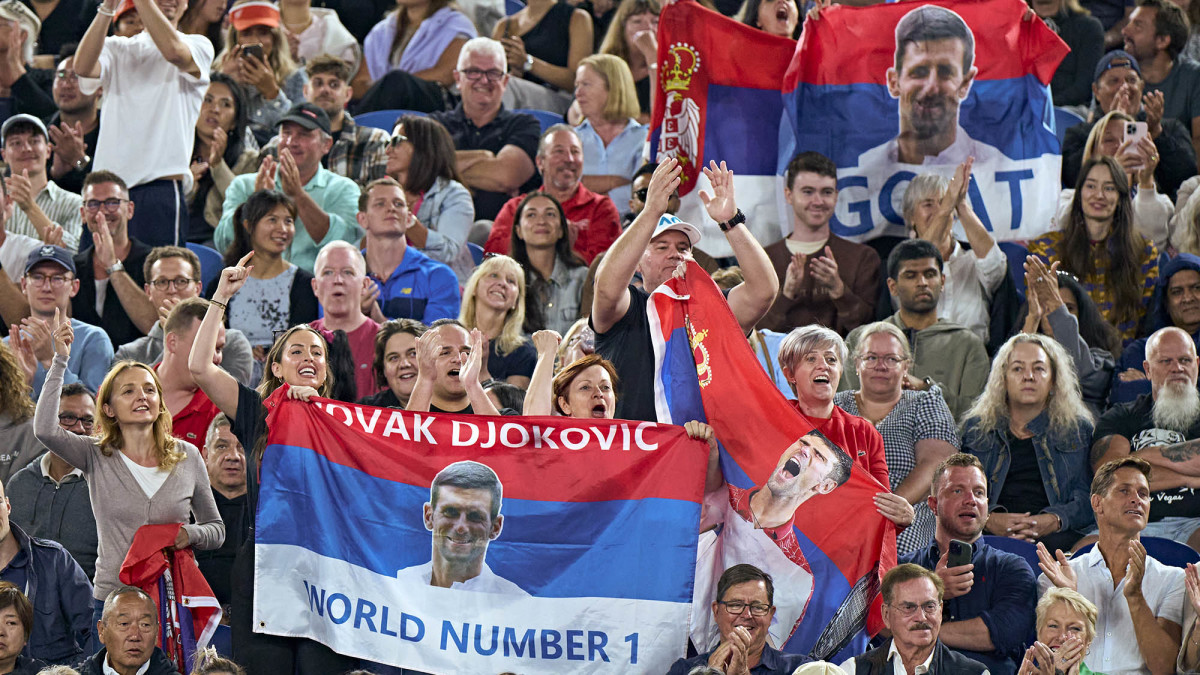
If geography is destiny for Djokovic, so is timing. When he first cannonballed into the pool, winning his first major in 2008, tennis was already ensconced in the Federer-Nadal era. Here were two players from familiar countries (Switzerland and Spain, respectively) who formed a classic study in contrasts. The grace and style of Federer, a righty; the toil and trouble of Nadal, a lefty. Fans had picked their player accordingly, but here was the rare (first?) sports rivalry where it seemed entirely reasonable to like both, as so much warmth and civility passed easily between the two principals. And then, suddenly, this preening, burr-haired kid from Serbia (Serbia?) interrupted both the rivalry and the easy story line.
Even as the tennis flaneurs gradually (and sometimes grudgingly) accepted Djokovic, and even as he turned the rivalry into a tri-valry, he was always the ankle-biter, the chaos agent, the awkward third-party candidate who could never match the two mainstays in popularity and polish. Federer and Nadal didn’t exactly welcome him to the fellowship, either. Djokovic recalls facing Nadal in the 2012 French Open finals. Before the match, the Spaniard sprinted around the small Roland Garros locker room they shared, playing music on his headphones so loudly that Djokovic could hear the lyrics. “I’m standing there,” he says, “and it’s pissing me off.”
Djokovic would lose the match. But, in retrospect, he appreciates that locker room moment as a disguised blessing. Here was an early lesson that competition starts before the first ball is struck. Soon, Djokovic says, he began to gird himself for battle and let every perceived slight—“who gets more soap and shampoo in the shower, who gets a better towel and stuff like this”—become fodder. “It was motivating me to do stuff myself and to show that I’m ready, you know? I’m ready for battle, for a war.”
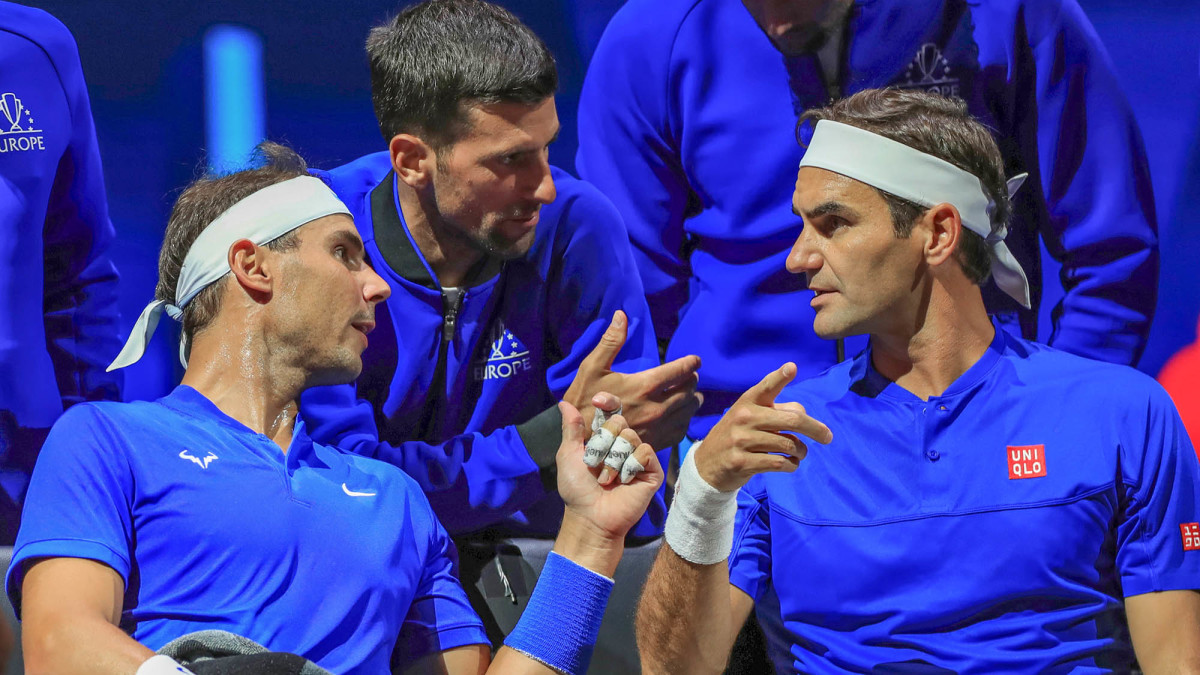
The other two guys played the equivalent of home games all over the world. Djokovic was inevitably the road player. “For most of my career it was mostly hostile environments, but I learned how to thrive in that environment,” he says. “People think it’s actually better if fans don’t like me. It gets the best out of my tennis.”
McEnroe agrees: “He’s the greatest that I’ve ever seen, by far, when the crowd is against him. I had some times—many times—when that took place. It felt like never to the extent of Novak. I didn’t handle it nearly as well.”
In the crucible of those hostile crowds, Djokovic forged strategies and coping mechanisms. He would go so far as to try to outwit himself into thinking the fans were cheering him, not booing him, that they were yelling “Novak, Novak,” not “Roger, Roger” or “Rafa, Rafa.” Sure enough, Djokovic would go on to hold winning head-to-head records against both.
And as Djokovic is quick to note, he also ultimately benefited from the rivalry’s birth order. In effect, he got to bat last, knowing precisely how he had to tailor his game to beat the two other guys, and exactly how many majors he needed to eclipse them. “Because they were so good in their craft, and because they were so mentally strong and so consistent, they forced me to really rise to their level,” he says. “[The rivalry] has given me the ability to understand what my flaws are, what my disadvantages are compared to them.”
Like all the truly great ones in any field, he is a master at eliminating variables and controlling everything he can in service of success. His competitors might scarf Waffle House and post videos of themselves playing Call of Duty with Mountain Dews resting near the console. Djokovic keeps the kind of diet that makes Tom Brady look like a Guy Fieri disciple. No more Red Bull pizza here. Gluten? No. Meat? No. Sea algae smoothies? Yes. Alcohol? No, save the occasional sip of Italian wine. (“French is a bit too strong.”) Dairy-free. No refined sugar. An indulgence comes in the form of a square of chocolate.
Djokovic monitors his sleep. He practices with a wearable device attached to his chest so he can track his biometrics. While his competition has a collective love of video games—No. 3–ranked Daniil Medvedev, who thwarted Djokovic’s Grand Slam bid in 2021, has banked 3,000(!) hours playing the game Rainbow Six Siege—Djokovic recently turned down a video game endorsement because he didn’t believe in the product. He prefers to use that time to write in his journal or, better still, be present for his wife, Jelena, and their kids, Stefan, 9, and Tara, 6.
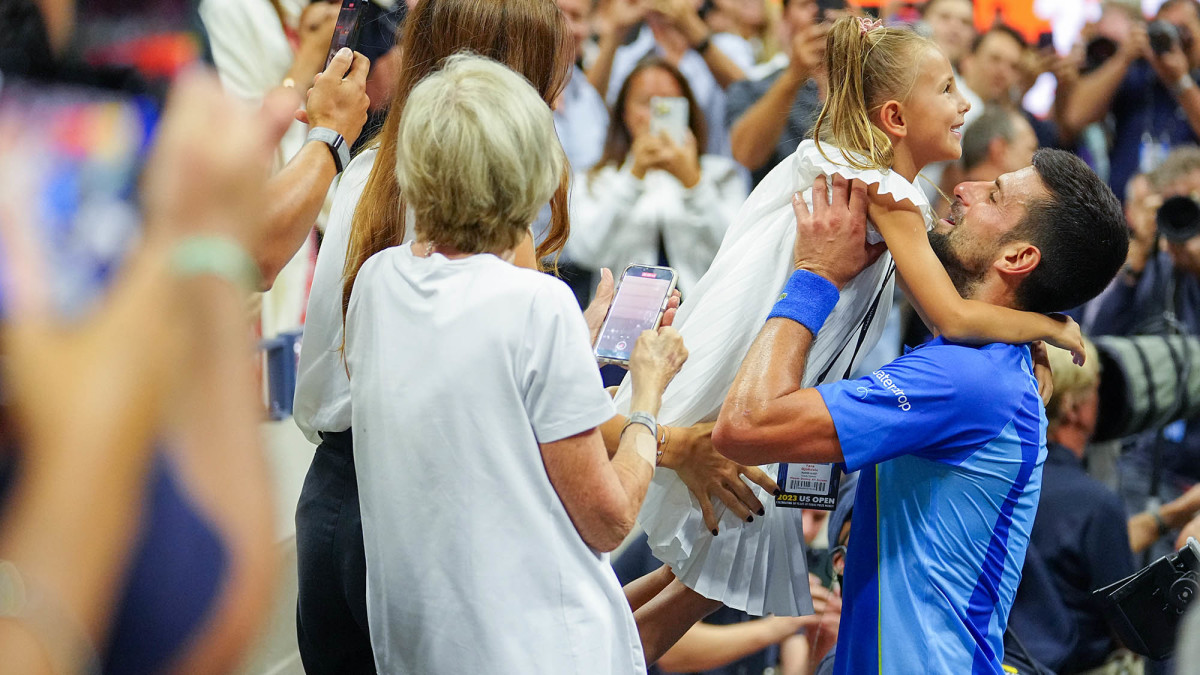
These sound, perhaps, like severe sacrifices. He doesn’t see it that way. “It’s lifestyle, really,” he says. “And it’s my choice. That’s how I want to eat. That’s how I want to live. Get a good amount of sleep and recovery. Go outdoors. Be in nature. Eat well, drink. Hydrate. Exercise. Movement. Activity. [I] try to have this kind of a holistic, healthy approach.”
He practices tennis. But he discovered years ago that there are only so many times he can maneuver a fuzzy, yellow ball over a net. And, besides, muscle memory is a powerful force. He’s not going to forget how to hit a serve; while he might “tinker” (his word), at this point, he’s no more going to change his service motion than Steph Curry is going to change his shooting motion.
What he can—and does—practice with increasing frequency is mental toughness. “People think that because you’re talented physically, you’re also talented mentally to overcome these circumstances and situations on the court,” he says. “It’s not like that. It’s years and years of hard work and dedication and understanding yourself more than anything else. What is the formula—the emotional, psychological formula that works well with the physical to create success?”
Pressed for specifics, he pauses. Then, as if deciding to reveal a tribal secret, he leans in. “Conscious breathing is a big part. And people might not think that that’s part of the mental work, but it is. Conscious breathing is super important—especially in the moments when you’re under tension. In an individual sport, you have no one to really replace you if something is going in the wrong direction. You just have to keep things very simple and look for the cues and anchors that really bring you back to the moment.”
Through trial and error, he says, he has settled on another coping device in times of stress: Let it all out, and then reset. “The difference between the guys who are able to be the biggest champions, and the ones that are struggling to get to the highest level is the ability to not stay in those emotions for too long. So for me, it’s really relatively short. So as soon as I experience it, I acknowledge it. I, maybe, burst. I scream on the court. Whatever happens. But then I’m able to bounce back and reset quite quickly.”
It works. Djokovic is often cited, correctly, for having no weakness in his tennis game. But his great strength is his mental impregnability. No player radiates his level of self-belief. No player possesses his survival instincts, his ability to summon his best tennis when he must.
At the age of 36, Djokovic might, absurdly, be in his prime. How would he fare today against the 24-year-old version of himself who won three majors in 2011? It would be close, he says. “I was faster 10 years ago. But I think I’m probably able to play smarter today. I’m also able to cope with the pressure moments better than I did.” That is, all that accumulated wisdom and confidence might just carry the day.
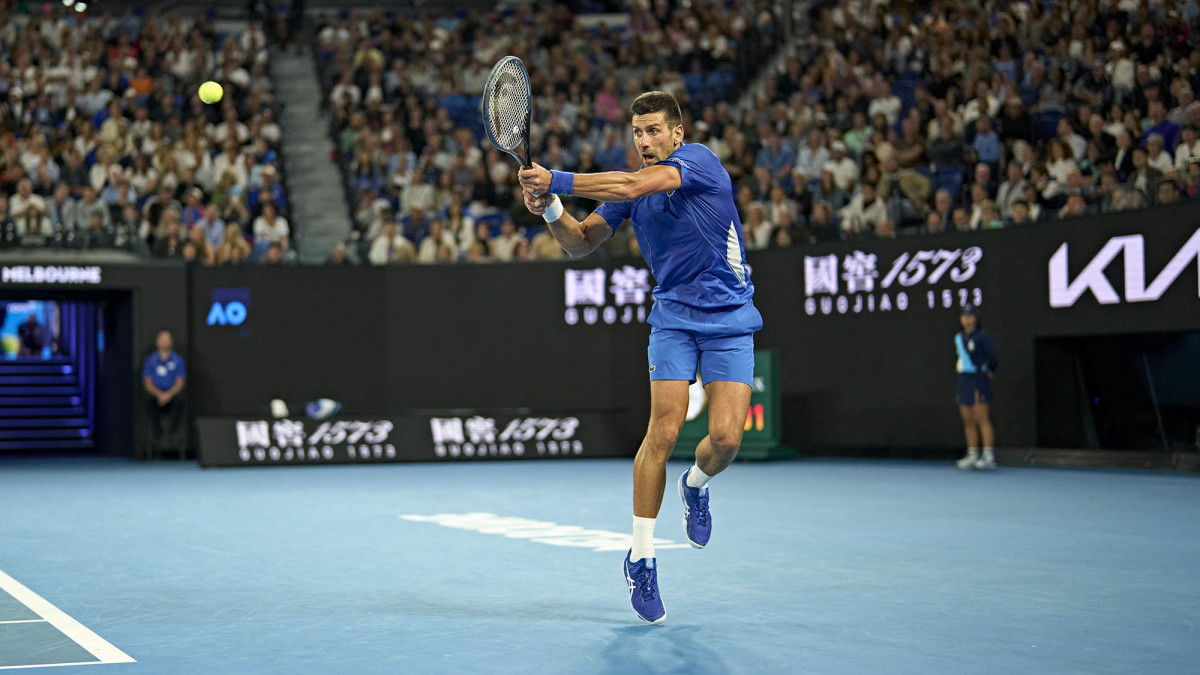
Spend any time speaking with Djokovic, it’s hard not to notice that he puts the word motivation into heavy rotation. He’s now shifted his. He has transitioned from ruling the Federer/Nadal axis to thwarting the new generation, making sure the rest of the field remains pretenders and not contenders. “I don’t feel like I’m chasing anything now,” he says. “I feel like I’m creating. That’s kind of a mindset I have.”
Last summer at Wimbledon, in what would mark his only defeat at a major in 2023, Djokovic effectively got out-Djokovic-ed by Spain’s Carlos Alcaraz. Age 20—which is to say closer chronologically to Djokovic’s kids than to Djokovic himself—Alcaraz played opportunistically, married offense with defense, and simply wouldn’t blink, winning a five-set classic, 1–6, 7–6 (8–6), 6–1, 3–6, 6–4.
By his own admission, Djokovic was despondent for a day, “like didn’t-want-to-talk-to-anyone-level upset.” At the same time, he had the good sense to know that this new challenge was ultimately for the better and as he puts it, would “awaken the beast” in him. With new motivation, with the joie de guerre, the love of combat, reignited, he came to the U.S. last summer determined to avenge that defeat. “It pissed me off so much that I needed to win everything on American soil, which I did.”
Catch that? “Which I did.” If this is the kind of self-aggrandizing that Federer and Nadal might have sidestepped, well, so be it. Djokovic admits he long played the role of pleaser, trying to give the public what they wanted. He’s now at the phase where, to use that annoyingly voguish bit of psychology, he’s true to his authentic self. The public may not like his decision not to get vaccinated against COVID-19. Ben Shelton, the young American player, may not like it when Djokovic beats him and then celebrates by mocking his trademark gesture. The traditionalists at Wimbledon may not like it when Djokovic smacks the net post. Too bad.
But, in the process something funny (and instructive) has happened. As he has stopped caring so much and editing his remarks in advance, as he simply lets it fly, his popularity has never been higher. He’s no longer tennis’s mustache-twirling cartoon villain. Far from it. At the 2024 Australian Open he was the toast of the event, his face displayed on all the signage, his presence requested (and often granted) at every sponsor event and ceremony. “Maybe it’s because Roger and Rafa are not there,” he says. “I do feel there is more love from the crowd, and I’m really appreciative and respectful of that.”
When will he know it’s time to say when? “Maybe the moment will become closer once I start not to win the Grand Slams and not to be able to be one of the main contenders for major titles. And once the young guys start kicking my butt, then I’ll probably start to rethink and question whether I should keep going. But for now, it’s all good.”
So good, that he can take a deep conscious breath. It’s still his court, still his kingdom.
